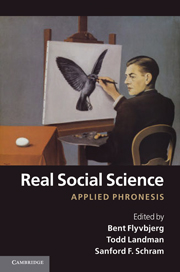Book contents
- Frontmatter
- Contents
- Figures
- Tables
- Contributors
- Acknowledgements
- 1 Introduction: new directions in social science
- Part I Theory and method
- 2 Phronetic social science: an idea whose time has come
- 3 Phronesis and narrative analysis
- 4 The feel for power games: everyday phronesis and social theory
- 5 Phronesis, projects and power research
- Part II Applied phronesis
- 6 Why mass media matter and how to work with them: phronesis and megaprojects
- 7 Power and conflict in collaborative research
- 8 Unsettling a settler society: film, phronesis and collaborative planning in small-town Canada
- 9 Phronesis and critical policy analysis: Heathrow's ‘third runway’ and the politics of sustainable aviation in the United Kingdom
- 10 Amnesty in the age of accountability: Brazil in comparative context
- 11 Feminist phronesis and technologies of citizenship
- 12 Making the teaching of social justice matter
- 13 Spatial phronesis: a case study in geosurveillance
- 14 Important next steps in phronetic social science
- Index
- References
3 - Phronesis and narrative analysis
Published online by Cambridge University Press: 05 June 2012
- Frontmatter
- Contents
- Figures
- Tables
- Contributors
- Acknowledgements
- 1 Introduction: new directions in social science
- Part I Theory and method
- 2 Phronetic social science: an idea whose time has come
- 3 Phronesis and narrative analysis
- 4 The feel for power games: everyday phronesis and social theory
- 5 Phronesis, projects and power research
- Part II Applied phronesis
- 6 Why mass media matter and how to work with them: phronesis and megaprojects
- 7 Power and conflict in collaborative research
- 8 Unsettling a settler society: film, phronesis and collaborative planning in small-town Canada
- 9 Phronesis and critical policy analysis: Heathrow's ‘third runway’ and the politics of sustainable aviation in the United Kingdom
- 10 Amnesty in the age of accountability: Brazil in comparative context
- 11 Feminist phronesis and technologies of citizenship
- 12 Making the teaching of social justice matter
- 13 Spatial phronesis: a case study in geosurveillance
- 14 Important next steps in phronetic social science
- Index
- References
Summary
Introduction
The phronetic approach includes an attention to method; the ways in which evidence is collected, coded and analysed; and the ways in which the inferences that are drawn from that analysis of evidence inform larger questions of appropriateness and the challenge to existing power relations with respect to the research topic area at hand. I think it is incorrect to cast the phronetic approach as somehow antithetical to strong method, or some form of ‘method-light’ that can be adopted by those who are more interested in the substance of social science research (see Landman 2008: 307–11; and Schram, Chapter 2, above). Indeed, Flyvbjerg (2006: 68–74) argues that he has been set up as a straw man for those who opposed the so-called ‘perestroika’ movement in the American Political Science Association, and argues forcefully (and with examples) why method sits squarely within the phronetic approach. His argument is that we as social scientists have spent perhaps too much time focusing on epistemé and techné to the neglect of phronesis.
I endorse this view, while at the same time wanting to make sure that we do not lose sight of the importance of the whole triumvirate of concepts that form the phronetic approach. As a comparative methodologist and scholar of human rights, I have argued over the years for the use of systematic methods that address otherwise normatively informed and value-based questions (see, e.g., Landman 2002, 2005). I see no contradiction in this perspective, especially if the careful and systematic analysis of human rights evidence can bring about their greater protection; a position that is consistent with a larger Weberian ‘value-rational’ tradition in the social sciences (see Landman 2005: 553–4; and Olsen, Payne and Reiter, Chapter 10, below). Quality systematic value-oriented research can and should contribute to incremental gains in knowledge. Contextually informed knowledge based on a phronetic approach can move beyond the cases under investigation and provide generalizations that are helpful for solving political problems in other contexts. In my own field, and as will be demonstrated in this chapter, learning about the struggle for and against human rights in particular political contexts is valuable for advocates in other contexts.
- Type
- Chapter
- Information
- Real Social ScienceApplied Phronesis, pp. 27 - 47Publisher: Cambridge University PressPrint publication year: 2012
References
- 19
- Cited by



